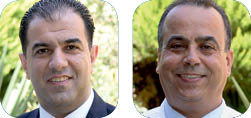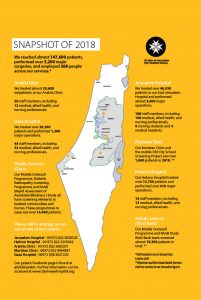Having healthy vision offers a window to a world of opportunities. At St John of Jerusalem Eye Hospital Group, our aim is to end preventable blindness throughout Palestine, and we have been doing so since 1882 by providing eye care to all, regardless of race, religion, or ability to pay.
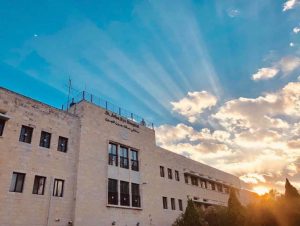
It has been estimated that for every £1 spent on eye care, the potential return for society is around £4.*1 The true economic benefits that result from eliminating avoidable blindness and vision impairments are likely to be higher than reported, as often it is hard to place a monetary value on these. Availability of and access to high-quality eye care allows our youth to be educated, our working-age populations to keep their ability to contribute fully to society, and our elderly to keep their independence.
We have a unique history that begins right in the heart of Jerusalem in the Mursitan Quarter of the Old City, where in 1080 AD a group of monks created an order focused on serving “their lords the sick and the poor.” This Order of St John went on to spread across the world and now operates under various formats, but always as a provider of health care (and uniformly recognizable by our 12-pointed Amalfi cross).
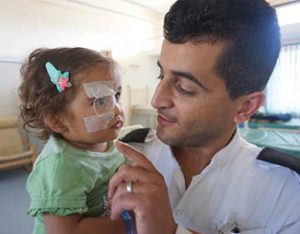
Prioritizing accessibility and quality of care to ensure success in tackling avoidable blindness
Being part of this global health care conglomerate brings with it many benefits, not least the connections to the best medical partnerships in ophthalmology. For over a century, we have been known for our ability to provide the highest levels of ophthalmic care, thanks to this international investment and development, which remains a major priority today. We are proud that our Jerusalem hospital was the first Palestinian hospital to gain the Joint Commission International accreditation, which is considered the gold standard for health care worldwide.
Access to eye care remains our number one priority. Several common eye conditions do not show symptoms until the damage they have caused is irreversible, and it is therefore vital to have regular eye checkups to ensure that there are no anomalies. (Incidentally, if you are reading this and have not had your eyes checked in the past two years, we highly recommend attending one of our clinics.)
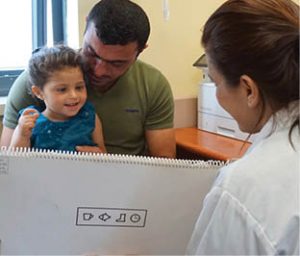
Due to movement restrictions on our target demographic, we have developed centers for eye-health screening in the northern and southern West Bank and in the Gaza Strip. Since 1980 we have also operated a rolling Mobile Outreach Programme that currently operates in two units, seven days per week, in the West Bank and another one in Gaza which launched in 2018. Thanks to our investment, last year we were able to reach 147,600 patients across Palestine, which was an 8 percent increase on the previous year.
Behind each patient is the story of a life changed. The father of Samah*2 knows this all too well, as Samah has been coming for treatment at our Hebron pediatric clinic for most of her life:
“My daughter means the world to me. When she was a baby, the first thing I wanted to do was look into her eyes. I was devastated when she began to have vision problems. We brought her straight to St John of Jerusalem Eye Hospital Group, where she has been receiving orthoptic care for her squint ever since. Both she and I know the doctors there well now, she loves them, and I trust them implicitly to take care of her precious eyes.”
In recent years we have also invested heavily in our ability to provide advanced ophthalmic care at our Gaza Hospital, as our Gazan patients experience the most difficulty in accessing East Jerusalem due to the ongoing blockade. We were delighted to open a state-of-the-art ophthalmic facility there in 2016, and since have been able to offer a number of subspecialty treatments for the first time.
Training future generations to become ophthalmic specialists
We are also the only hospital in Palestine to offer treatments for all subspecialties of ophthalmology (excluding oncology). Our medical residency program is the only ophthalmic training program for doctors in Palestine, and through this we have trained a generation of Palestinian ophthalmic specialists. Once qualified, our ophthalmic specialists have the option to undertake subspecialties at some of the world’s best eye care centers, such as Moorfields in London, and benefit from regular teaching visits from the crème de la crème of the ophthalmic world.
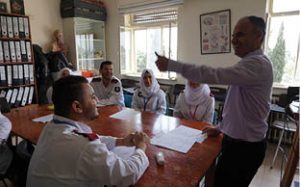
Our Sir Stephen Miller School of Nursing for the subspecialty of ophthalmic nursing is similarly lauded. The school has been accredited by the University of West London for a number of years, but we were delighted that it was promoted last year to a Level 6 NVQ Qualification, a reflection of our ambition to continue to raise the standards of our training and the quality of care.
Researching best practice for eye care in Palestine
Of course, tackling avoidable blindness cannot truly be achieved effectively without understanding the nature of the problem. This is why research has been a major focus of our work for several years.
In 2008, we launched Palestine’s first-ever Rapid Assessment of Avoidable Blindness (RAAB). From this study we learned that a major cause of blindness in the country was diabetic retinopathy. For several years we have been working to gain an understanding of the prevalence of the condition in Palestine and of the knowledge and practices of health care providers who work with diabetic patients. From this we hope to develop a best-practice model to tackle this condition, within our unique constraints. In 2018, we launched Palestine’s second-ever RAAB study, which is due to be completed in May this year. It will allow us to understand where best to focus our efforts in the coming decade.
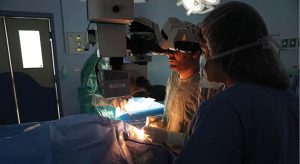
Sustaining our services for the future
All of the above does not come without cost (namely around £11 million per year). Around 50 percent of our income is from charitable donations, both local and international. Unfortunately, like our fellow East Jerusalem network partners, we were faced with a major blow to this funding with the US cuts to Palestinian health aid in October 2018. This and other economic factors, such as the “Brexit effect” (as a large majority of our voluntary income is from the United Kingdom), have hit us hard in the past few years. We were very humbled by the global response to our emergency appeal last year – which raised well above £500,000 – but we are still searching for a sustainable model of income to replace what has been lost by the cuts.
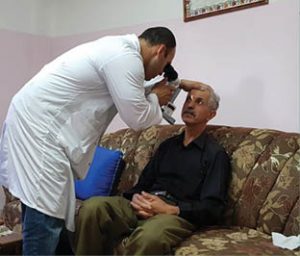
The majority of our remaining income comes from medical referrals. We were therefore pleased to develop our private services in 2018, with the launch of our Laser Refractive (LASIK) Suite. All profits from this treatment will be fed directly back into our patient relief fund to ensure that the most vulnerable of our society will be able to access eye care. Please do consider us if you are contemplating laser eye surgery.
There is no doubt that our work is a vital cog in the Palestinian economy and society, and it is an honor to have been serving our country for almost 140 years in this capacity. We hope to serve you for several generations to come.
Currently St John of Jerusalem Eye Hospital Group is managed by the first Palestinian Joint CEOs.
*The authors would like to thank marketing officer Marie-Claire Boyle for her assistance in preparing this article.
Your support is vital to the continuation of our work. You can wire your donation to:
St John Eye Hospital in Jerusalem
Bank of Palestine
Bethlehem Branch
Account # 396660
IBAN# PS39 PALS 0450 0396 6600 0130 0000 0
*1 Investing in vision − making a difference across the Commonwealth, The Queen Elizabeth Diamond Jubilee Trust, 2018, available at https://www.jubileetribute.org/img/news/FINAL-Investing-in-vision-report-100418.pdf.
*2 Name changed to protect identity.

